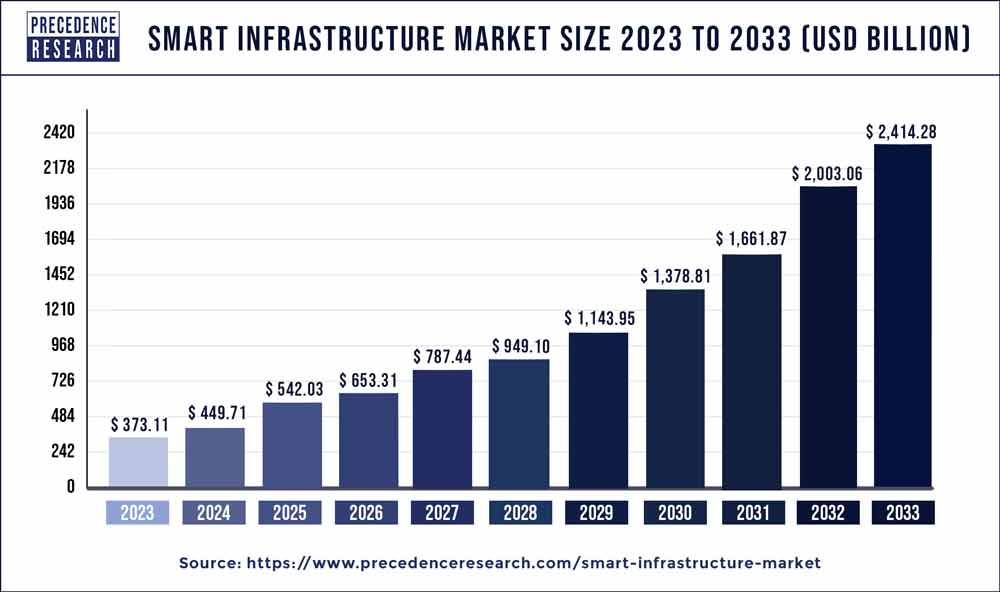Key Points
- North America dominated the market with the largest share of 32% in 2023.
- Asia Pacific is observed to expand at the fastest rate during the forecast period.
- By offering, in 2023, the products segment has contributed more than 70% of the market share.
- By offering, the service offering segment is to experience the highest growth rate.
- By type, in 2023, the smart transportation system segment held the largest share of the market.
- By type, the smart waste management segment will experience the fastest growth.
- By end-user, in 2023, the non-residential segment claimed the largest market share of 75%.
- By end-user, the residential segment is observed to experience the fastest expansion during the forecast period.
The Smart Infrastructure market is witnessing unprecedented growth, driven by the increasing integration of advanced technologies into traditional infrastructure to enhance efficiency, connectivity, and sustainability. This sector encompasses a broad spectrum of applications, including smart cities, transportation, energy, and buildings. The global demand for intelligent infrastructure solutions is on the rise as governments and organizations seek innovative ways to address urbanization challenges and create more resilient and sustainable communities.
Growth Factors
Several key factors contribute to the robust growth of the Smart Infrastructure market. The proliferation of Internet of Things (IoT) devices, coupled with advancements in sensor technologies, is a primary growth driver. These technologies enable real-time data collection and analysis, empowering infrastructure systems to adapt dynamically to changing conditions. Additionally, the emphasis on sustainability and energy efficiency fuels the adoption of smart solutions in areas like smart grid systems, energy management, and eco-friendly building practices.
The increasing need for seamless connectivity and communication further propels market expansion. Smart infrastructure facilitates better communication between various components of a system, enhancing overall efficiency and reducing downtime. As the world becomes more interconnected, the demand for integrated and intelligent infrastructure solutions is expected to escalate.
Smart Infrastructure Market Scope
| Report Coverage |
Details |
| Growth Rate from 2024 to 2033 |
CAGR of 20.53% |
| Global Market Size in 2023 |
USD 373.11 Billion |
| Global Market Size by 2033 |
USD 2,414.28 Billion |
| U.S. Market Size in 2023 |
USD 83.58 Billion |
| U.S. Market Size by 2033 |
USD 540.80 Billion |
| Base Year |
2023 |
| Forecast Period |
2024 to 2033 |
| Segments Covered |
By Offering, By Type, and By End-user |
| Regions Covered |
North America, Europe, Asia-Pacific, Latin America, and Middle East & Africa |
Smart Infrastructure Market Dynamics
Drivers:
The Smart Infrastructure market is driven by a confluence of factors that accelerate its growth trajectory. Government initiatives and investments in smart city projects, aimed at improving the quality of life for citizens, play a pivotal role. These initiatives encompass the deployment of smart transportation systems, intelligent energy grids, and innovative public services, creating a conducive environment for market growth.
Rapid urbanization also acts as a driver, as cities worldwide grapple with the challenges of accommodating growing populations. Smart infrastructure offers solutions to enhance urban mobility, optimize resource utilization, and improve overall urban planning. Furthermore, the increasing awareness of the environmental impact of traditional infrastructure practices fosters the adoption of smart and sustainable alternatives.
Opportunities:
The Smart Infrastructure market presents vast opportunities for innovation and investment. The integration of Artificial Intelligence (AI) and machine learning into infrastructure systems opens new frontiers for automation, predictive maintenance, and optimized resource allocation. The development of smart grids and the expansion of renewable energy sources provide opportunities for companies to contribute to a greener and more sustainable future.
Emerging economies present untapped markets with significant potential for growth. As these countries undergo rapid industrialization and urbanization, there is a growing need for efficient and intelligent infrastructure solutions. Collaborations between public and private sectors to develop and implement smart city projects create avenues for business expansion and technological advancements.
Restraints:
Despite the promising outlook, the Smart Infrastructure market faces certain challenges that may impede its growth. High initial costs associated with the deployment of smart technologies pose a barrier for some regions and industries. Additionally, concerns related to data security and privacy hinder the widespread adoption of interconnected infrastructure systems, as individuals and organizations remain cautious about potential vulnerabilities.
Interoperability issues between different smart infrastructure components can also present challenges. The lack of standardized protocols and communication interfaces may result in compatibility issues, slowing down the seamless integration of diverse smart systems. Regulatory hurdles and a lack of skilled workforce capable of managing sophisticated technologies further contribute to the restraining factors in this market.
Read Also: Non-Alcoholic Beverages Market Size To Hit USD 2,508.66 Bn by 2033
Competitive Landscape:
The Smart Infrastructure market is characterized by intense competition among key players striving to gain a competitive edge through technological innovation and strategic partnerships. Leading companies invest heavily in research and development to introduce cutting-edge solutions, solidifying their market position. Partnerships with technology providers, government bodies, and other stakeholders are common strategies to create comprehensive and integrated smart infrastructure ecosystems.
Key players in the market include multinational corporations specializing in technology solutions, as well as niche players offering domain-specific expertise. As the market evolves, mergers and acquisitions are prevalent, enabling companies to broaden their service portfolios and expand their geographic reach. The competitive landscape is dynamic, driven by the constant evolution of technology and the pursuit of market leadership in the rapidly growing smart infrastructure sector.
Smart Infrastructure Market Companies
- ABB
- Aclara Technologies LLC (Hubbell Incorporated)
- Broadcom, Inc. (VMware)
- Cisco Systems, Inc.
- Dynamic Ratings
- Honeywell International Inc.
- Hewlett Packard Enterprise Development LP
- Huawei Technologies Co., Ltd.
- International Business Machines Corporation
- L&T Technology Services Limited
- Panamax Infotech
- Schneider Electric
- Siemens
- Wipro
- Xylem (Sensus)

